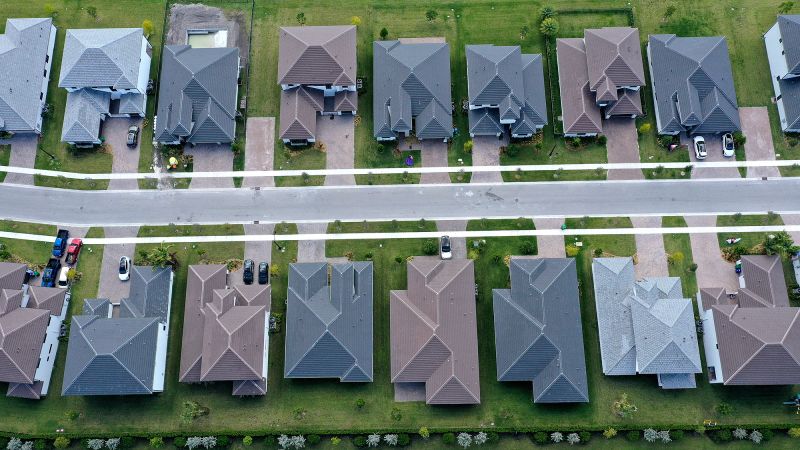Buying a family-sized home with three or more bedrooms used to be manageable for young people with children. But with home prices climbing faster than wages, mortgage rates still close to 23-year highs and a shortage of homes nationwide, many Millennials with kids can’t afford it. And Gen Z adults with kids? Even harder.
Meanwhile, Baby Boomers are staying in their larger homes for longer, preferring to age in place and stay active in a neighborhood that’s familiar to them. And even if they sold, where would they go? There is a shortage of smaller homes in those neighborhoods.
As a result, empty-nest Baby Boomers own 28% of large homes — and Milliennials with kids own just 14%, according to a Redfin analysis released Tuesday. Gen Z families own just 0.3% of homes with three bedrooms or more.



Nice to gloss over the fact that home mortgage rates were double what they are now when they were buying them. My boomer parents’ rate was 12% for the majority of their 30-year mortgage (and that was considered great!). We’re trying to get them to move out of their 6 bedroom home I grew up in but they have deep roots where they are and aren’t interested in moving anytime soon.
I’m not a math whiz, but just using an online loan interest calculator, comparing the total cost of the median loan to median salaries for 1990 vs today, that 12% rate still doesn’t make up for the difference in home prices and the stagnating wages young people face today. Seven percent mortgage rate today (which is being generous) compared to 12% yesteryear, at homes that were one quarter of today’s price, with salaries that have grown by barely a third… it just doesn’t add up. I’m not saying your parents are wrong, I’m saying there is something wrong.
That was the entire point of mortgages. You’re paying interest, and could end up paying well over the original house value, but over a long enough time period, via inflation and property values increasing, you’re still making out ahead of renting. Depending on the mortgage interest rate, you could be better off not paying it off early.
For example, I refinanced my house at 2.6%. Afterwards I started paying extra principal payments. My mother the accountant told me to stop. The interest rate is lower than inflation, I’m better off using the money for other things or putting it into higher yield savings accounts instead of paying it off earlier than schedule.
That’s a fair point, if you’re among those who don’t wait the length of time for an entire generation to come of age and two thirds of your loan period to pass before you get to see lower interest rates. Between the late 70s and early 80s there was a steep rise in mortgage rates, but this quickly dropped off and returned to early 1970s rates. Rates stayed mostly constant from then until the 2000s when they began to drop off, reaching a near once-in-a-lifetime historic low just a few years ago.
Wages haven’t risen with inflation to allow others to reap the benefits of buying in and waiting for their property values to soar. And the topic in this particular thread isn’t renting vs buying. The original commenter stated that the article didn’t consider their parents’ 12% mortgage rate. This specific discussion is about whether holding onto a 12% loan for thirty years at a starting 1990 salary is equivalent to today’s rate with today’s prices at today’s salary—and it’s not.
I’m not disagreeing. It’s worse now. But it’s not nearly as a gulf as they’re trying to make it sound. Remember, 12% was basically rock bottom and not average. I am curious as to what the difference amortized is, just too tired to find the calculator at the moment.
That’s not true though. The average 30-year fixed rate in 1990 was a little over 10%.
Why are you assuming it was the 90s?
The age range of millennials, the age of boomers, the idea that a forever long-term home is likely a second or third home purchase, your statement that you grew up in that house and are presumably a millennial. What year are we talking then? Average rates were level ‘85-90 in the 10% range, dropping after that.
I didn’t say I was a millennial. You make a lot of assumptions.
I’d say “some,” not a lot. And I’d also qualify them as reasonable assumptions given the article content and your original comment. But regardless, you agree things are worse now, and to the people who can’t afford homes, being in a situation that’s only a bit worse rather than impossibly worse could be a meaningless distinction. As I said, your parents are not the problem just because they want to stay in their home, but there is a problem.
Oh I’m not disagreeing. I just don’t like it when facts are left out for a narrative.
Sounds like someone is worried about “their” inheritance.
My wife and I are quite well off and don’t want or need their money or property. I’d be happy if they get to the end and just used up the last cent. They’ve earned it!
deleted by creator